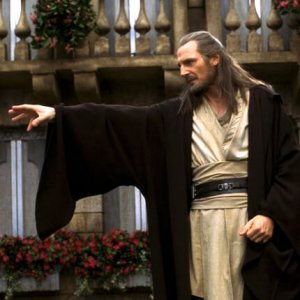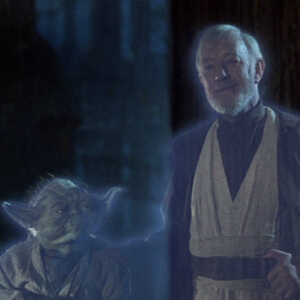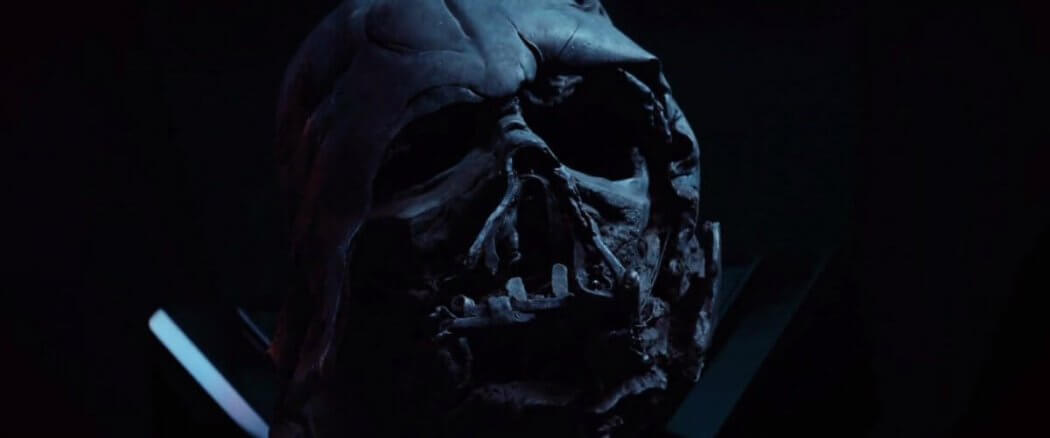We are now six deep. In two months, it will be seven. In two months, the enchantment of the Star Wars Universe will expand and our intrigue will deepen. It’s no longer just a world of weird Wookies and speculative science fiction. Many of us, myself included, grew up with access to the Star Wars Universe, an alternative reality where we felt at home, a place where we put some of our modern presuppositions on hold while at the same time stretching others. But it’s far more than an individual treat; it’s a shared cultural experience, not unlike a shared sanctuary. Secular or sacred, Christian or atheist, we can shelve our beliefs and biases and share a universe, a universe where, for a few hours, we share a sacred experience.
The divinity in this universe isn’t “God,” per se, but it is something sacred, some kind of divine presence — this is a universe of The Force. For a few hours, we can let ourselves be lost, together, in a reality where the energy of the Force binds us all together, all life. I just saw in the news that in Odessa, Ukraine, they have converted a memorial to Vladimir Lenin into a monument to Darth Vader. Nonetheless, the lines between fact and fiction seem set, and I think that this tells us something about our modern biases, the modern “death of God,” and the virtual collapse of confidence in the church.
The Death of God
The genius of Lucas was to create a world that was somehow familiar enough that we could buy into it while at the same time being a radical departure from what is normal. His intent was to try to tap into something very primal in human beings and very basic to the operation of our minds, yet this world had to be far enough removed from our real world that it didn’t threaten to destabilize our paradigms. Lucas succeeded.
 One of the things that most intrigues me is that this world that Lucas created would have been more familiar, in many ways, to the pre-modern mind than to those of us in the modern. Bracket aside the spacecraft and other technology and look only at the more core ways-of-being within the Star Wars Universe. In the worldview of ancient or medieval people, it would not have seemed very odd to talk about The Force. In other words, I’m suggesting that there is something that Jesus, Paul, and the biblical writers would have shared in common with the Star Wars Universe that is now, largely, lost on us. The Force, I’m suggesting, is in many ways closer to the way the pre-modern prophets of the Christian faith would have viewed God and the world. Even for a Christian in the modern era, a Christian who believes in miracles, these miracles are perceived strictly along the lines of “divine intervention.” Clearly there is divine intervention in the ancient Christian faith, but what if Jesus performed his miracles in a way that was a good deal more like a Jedi manipulating the energy of the objects, like raising star ships out of the swamp waters?
One of the things that most intrigues me is that this world that Lucas created would have been more familiar, in many ways, to the pre-modern mind than to those of us in the modern. Bracket aside the spacecraft and other technology and look only at the more core ways-of-being within the Star Wars Universe. In the worldview of ancient or medieval people, it would not have seemed very odd to talk about The Force. In other words, I’m suggesting that there is something that Jesus, Paul, and the biblical writers would have shared in common with the Star Wars Universe that is now, largely, lost on us. The Force, I’m suggesting, is in many ways closer to the way the pre-modern prophets of the Christian faith would have viewed God and the world. Even for a Christian in the modern era, a Christian who believes in miracles, these miracles are perceived strictly along the lines of “divine intervention.” Clearly there is divine intervention in the ancient Christian faith, but what if Jesus performed his miracles in a way that was a good deal more like a Jedi manipulating the energy of the objects, like raising star ships out of the swamp waters?
Even the most dedicated true believer is still a modern person and believes that the world fundamentally operates according to rules of cause and effect, according to “natural law.” This is fundamentally not the world of Star Wars nor of the pre-modern, and this strikes me as more than a mild theological curiosity. I think there are important connections to be made to the “death of God” in modern thought and the fact that, closer to home, we in the U.S. are witnessing a decline of interest in religion, Christianity, and the church.
Enchanted Worlds: “A Long Time Ago, In a Galaxy, Far, Far, Away”
In his A Secular Age (2007), Charles Taylor (philosopher and Roman Catholic) asks, “Why was it virtually impossible not to believe in God in, say, 1500 in our Western society, while in 2000 many of us find this not only easy, but even inescapable?” God’s presence retreated in three dimensions. (1) People no longer see natural events as acts of God. (2) Society “could only be conceived as grounded in something higher than human action in secular time.” (3) People lived then in an enchanted world, now in disenchantment. It’s this third point that intrigues me.
For the pre-modern, there were saints and demons and spirits. These were not all subjective agents acting within an impersonal world. Taylor makes a point of noting that power and meaning resided in the things themselves, like relics, sacramental hosts, and the enchanted forest. In fact, there was no clear line drawn between personal and impersonal forces. “In this [pre-modern] world, there is a whole gamut of forces.”
In the pre-modern world, meaning was inherent in the external world. By contrast, in the modern world, meaning is in mind. In the worldview of the pre-modern person, Taylor notes, objects can impose meaning by bringing us into their “field of force.” Charged objects can affect other objects, the objects are imbued with causal power. Again, by contrast, our modern external world is based on cause and effect, regulated according to natural law. To me, this contrast is striking. The Christian faith was formed in and for a different worldview, one increasingly unfamiliar to moderns.
A New Hope?
Personally, when it comes to my view of modern Christianity, I confess to having had a complete collapse in confidence. The contemporary church seems as entrenched in hierarchies of power and control as any institution. Ethically, it is secular institutions and activists leading the way on things like climate change, gender empowerment, economical equality and justice, and the rights of oppressed groups (human and non-human). And spiritually, I’ve yet to be a part of a Christian community where substantial and sustained growth are cultivated and central to the spiritual experience.
 This may all ultimately serve for the better, though. It means that Christianity, if it is to survive and thrive, must detach itself from the current corrupted and/or stagnant mainstream movements, face alienation from Christians who (ironically) will call it heretical, and once again view itself as an outsider, as small groups of counter-cultural freaks who don’t fit in anywhere, who are truly not “of the world” and yet whose pathos, whose passion and heart, is for the liberation of the very same world from which they have been estranged.
This may all ultimately serve for the better, though. It means that Christianity, if it is to survive and thrive, must detach itself from the current corrupted and/or stagnant mainstream movements, face alienation from Christians who (ironically) will call it heretical, and once again view itself as an outsider, as small groups of counter-cultural freaks who don’t fit in anywhere, who are truly not “of the world” and yet whose pathos, whose passion and heart, is for the liberation of the very same world from which they have been estranged.
If there is any hope for this to happen, Christians must engage their imagination, otherwise we fall back into conventional forms of Christian faith and organization. Engaging the imagination means looking to creative works — secular and sacred — to inspire a form of belief and Christian practice that is at once far more ancient and at the same time more relevant to contemporary reality. Star Wars and other films can become a portal back to a less modern way of viewing the world, can stretch our presuppositions, can inspire in us provocative questions which marinate and generate new ideas for viewing our world, for understanding our prejudices, and for untethering ourselves from our biases.
What if The Force was real? What if the miracles of Jesus were a lot more like those portrayed by George Lucas? What if we do not see it because we do not believe it? Asking these and other questions allow us to break out of stagnation, personally and as faith communities. Breaking free of convention is, I believe, our only hope.




